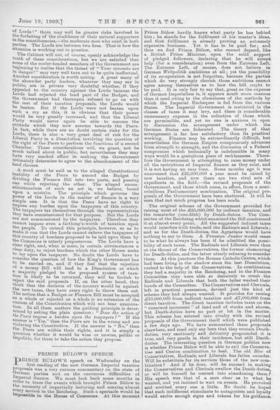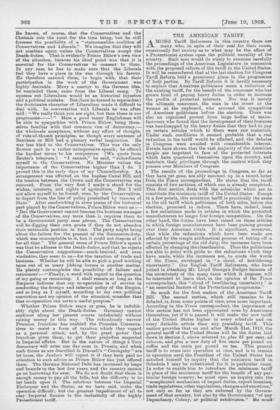PRINCE BULOW'S SPEECH.
PRINCE BOLOW'S speech on Wednesday on the first reading of the new German Imperial taxation proposals was a very curious commentary on the state of German parties and on the enormous difficulties of Imperial fivance. We must look back some mouths in order to trace the events which brought Prince Billow to the necessity of impartially lecturing and coaxing almost ?very section in the Reichstag. Such a spectacle would be Impossible in the House of Commons, At this moment Prince Billow hardly knows what party ho has behind him ; he stands for the fulfilment of his master's ideas, and that fulfilment is already proving an extremely expensive business. Yet it has to be paid for ; and thus we find Prince Billow, who cannot depend, like a British Prime Minister, upon the solid support of pledged followers, declaring that he will accepb, help (for a consideration) even from the Extreme Left. The Extreme Left, of course, does not believe in German Weltpolitik ambitions at all ; yet the possibility of its co-operation is not forgotten, because the parties which do very strongly cherish those ambitions cannot agree among themselves as to how the bill ought to be paid. It is only fair to say that, great as the expense of German Imperialism is, it appears much more onerous than it need owing to the clumsiness of the methods by which the Imperial Exchequer is fed from the various States. The Imperial Government is restricted in the classes of taxes it may levy, and there is considerable unnecessary expense in the collection of those which are permissible, and yet no one is anxious to open to discussion the arrangement under which the German States are federated. The theory of • that arrangement is far less satisfactory than its practical working. Finance may be extraordinarily difficult, but nevertheless the German Empire conspicuously advances from strength to strength, and the discussion of a Federal compromise which technically is indefensible in many ways would be a gratuitous piece of recklessness. There- fore the Government is attempting to raise money under all the restrictions of Imperial finance as they exist, and it is not having an easy time. Seine mouths ago it was announced that £25,000,000 a year must be raised by new taxation, and now there are two rival sets of expedients in the field,—the revised proposals of the Government, and those which come, in effect, from a semi- rebellious Parliamentary combination. The original pro- posals of the Government have been shattered. it will be seen that not much progress has been made.
The original scheme of the Government provided for raising most of the £25,000,000 by indirect taxation, and the remainder (one-fifth) by Death-duties. The Com- mittee of the Reichstag which examined the Bill condemned it at almost every point. All the suggested indirect taxes would interfere with trade, said the Radicals and Liberals ; and as for the Death-duties, the Agrarians would have nothing to say to them. A Prussian Junker would cease to be what he always has been if be admitted the possi- bility of such taxes. The Radicals and Liberals were thus at the throat of the Conservatives, the former clamouring for Death-duties, and the latter utterly refusing to consider them. At this juncture the Roman Catholic Centre, which had been living in the shadow since the last Dissolution, rushed to the help of the Conservatives. Ia combination they had a majority in the Reichstag, and in the Finance Committee they were able so decisively to crush the Radicals and Liberals that both the latter washed their hands of the Committee. The Conservatives and Clericals, left in practical possession, devised just the kind of scheme they had always wanted. It provides for raising £19,000,000 from indirect taxation and £7,000,000 from direct taxation. The direct taxation includes taxes on the " unearned increment " of land and of stocks and shares, but Death-duties have no part or lot in the matter. This scheme has entered into rivalry with the revised proposals of the Government itself which were published. a few days ago. We have summarised these proposals elsewhere, and need only say here that they contain Death- duties, very cautiously and delicately propounded it is true, and very gentle in their incidence, but still Death- duties. The interesting question in German politics now is whether Prince Biilow will be able to call the Couserva- tiso and Centre combination to heel. The old Bloc of Conservatives, Radicals, and Liberals has fallen asunder. Will he substitute for its services those of the new com- bination? And if he does, will he succeed in making the Conservatives and Clericals swallow the Death-duties, or will he himself be coerced into abandoning them ? His speech was that of a man clear as to what he wanted, and yet inclined to wait on events. He provoked and soothed every one a little. No doubt he hoped that such indifferent stimulants to antagonism and loyalty would excite enough signs and tokens for his guidance:. Re knows, of course, that the Conservatives and the Clericals rule the roost for the time being, but he still foresees the possibility of a " statesmanlike coalition of Conservatives and Liberals." We imagine that they will not oombine again unless the Conservatives accept the Death-duties. That is evidently Prince Billow's own view of the situation, because his chief point was that it is essential for the Conservatives to consent to them. In any case, he has to make sure that the Liberals feel they have a place in the sun through his favour. He therefore assured them, to begin with, that their participation in the work of the Government was highly desirable. Many a martyr to the German idea, he reminded them, came from the Liberal camp. To squeeze out Liberalism would be an historical injustice and apolitical mistake. But (here he turned to reproaches) the doctrinaire character of Liberalism made it difficult to deal with. In conversation with Liberals he was often told : " We really think you are right, but then there is our programme— ! " Here a good many Englishmen will be able to sympathise with Prince Bfilow, being them- delves familiar with that common vice of democracy,— the wholesale acceptance, without any effort of thought, of rule-of-thumb principles, as though every sentence of Bentham or Mill had a plenary verbal inspiration. He was less kind to the Conservatives. This was the only Roman part in a rather unimpressive speech ; he offered the hardest terms to his conquerors. (We quote from Reuters telegram.) "I cannot," he said, " subordinate myself to the Conservatives. No Minister values the importance of the Conservatives higher than I do. I proved this in the early days of my Chancellorship. An arrangement was effected on the hapless Canal Bill, and the tension between the Crown and the Conservatives was removed. From the very first I made a stand for the wishes, interests, and rights of agriculture. But I will not allow myself to be forced, even by the Conservatives, to depart from the line of policy prescribed by reasons of State. ' After sandwiching in some praise of the historical part played by the Conservatives, Prince Bfilow went on :— " But the Government cannot become the business manager of the Conservatives, any more than it requires them to be .a Government party sans phrase. The Conservatives will be digging their own grave if, they do not abandon their untenable position in time. The party might briug about the failure for the present of the Succession-duty, which was unacceptable to it, but it could not dispose of it fer all time." The general sense of Prince Biilow's speech was that he adheres to the Death-duties, and that he rejects the Conservative suggestions—crack-brained, and even vindictive, they seem to us—for the taxation of trade and business. Whether he will be able to pick a good working team out of so many jibbing horses is another . matter. Ile plainly contemplates the possibility of failure and retirement :—" Finally, a word with regard to the question of my going or remaining. I shall remain so long as the Emperor believes that my co-operation is of service in conducting the foreign and internal policy of the Empire, and so long as I myself, according to my own political conviction and my opinion of the situation, consider that that co-operation can serve a useful purpose."
Whether Prince Biilovv stays or goes, he is indubit- ably right about the Death-duties. Germany cannot continue along her present course indefinitely without raising money in this way. The ridiculously narrow Prussian franchise has enabled the Prussian Conserva- tives to resist a form of taxation which they regard SS a personal attack, and, by the great power that franchise gives them, to get their prejudice respected in Imperial affairs. But in the nature of things a Tory democracy will arise one day even in Prussia, and when such forces as are described in Disraeli's " Coningsby " are let loose, the Junkers will regret it if they have paid no attention to such advice as Prince Billow has just offered them. The German National Debt has increased by leaps and bounds in the last few years, and the country cannot go on borrowing for ever. We do not doubt that there is enough money to pay all the bills, but the difficulty is to lay hands upon it. The relations between the Imperial Exchequer and the States, as we have said, make the operation difficult ; but the greatest impediment 'of all to easy. Imperial finance is the inelasticity of the highly Protectionist tariff.











































 Previous page
Previous page